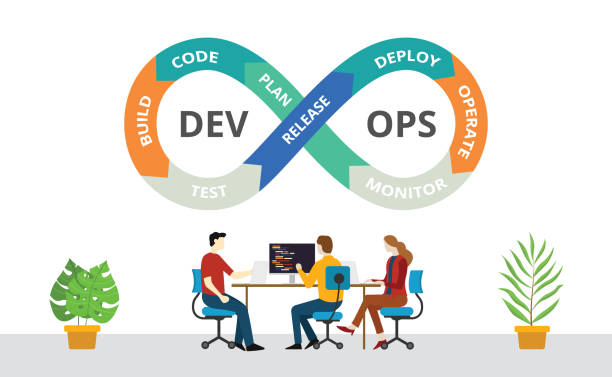In the dynamic arena of modern IT, where rapid software development meets seamless operation, stands the invaluable role of the DevOps Engineer.
This role, nestled at the intersection of technological innovation and operational efficiency, is reshaping how businesses think about software delivery. No longer are development and operations siloed entities; they are collaborative forces, driving value and innovation at record speeds.
As companies globally recognize the unmatched value of DevOps practices—faster releases, higher-quality software, and improved collaboration—the demand for skilled DevOps engineers has skyrocketed. Yet, the path to becoming a proficient DevOps engineer is intricate, demanding a unique blend of technical skills, tool expertise, and a deep understanding of collaborative principles.
For those aspiring to embark on this rewarding journey, understanding the necessary skills and knowledge areas is crucial. From mastering the foundational DevOps principles and practices to diving deep into container orchestration and cloud operations, every step is a building block towards DevOps mastery.
In this career path, we not only detail the vital skills and tools that shape a successful DevOps Engineer but also introduce the comprehensive courses offered at Bilginç IT Academy, designed meticulously to equip you with the expertise the industry demands.

The Ultimate DevOps Engineer Career Path
To thrive as a DevOps engineer, it's essential to grasp the intricacies of the software development life cycle (SDLC). Mastery over DevOps tools and processes is crucial, as the role often involves balancing coding, integration, and testing responsibilities.
A typical DevOps career progression might begin as a Release Manager, evolve into roles like DevOps Test Engineer and DevOps Cloud Engineer, and culminate in a position such as a DevOps Architect.
Top tech firms, including Accenture, Barclays, and Facebook, continually seek adept DevOps experts. Notably, those with advanced certifications and a broader skill set command higher salaries. Yet, the industry faces a talent shortage, primarily because the DevOps field, while lucrative, is demanding. Succeeding in DevOps means taking full accountability and continuously innovating.
Before beginning a DevOps career, you need to know your key responsability areas.
Key Responsability Areas
To excel as a DevOps engineer, it's imperative to possess and cultivate the following attributes and skills that reflect the essence of the DevOps philosophy:
- Proficiency in a diverse set of software development tools and technologies.
- Ease with frequent testing and deployment routines.
- Hands-on experience in managing production environments.
- A deep understanding of IT infrastructure.
- Expertise in data handling and management.
- A driven attitude focused on realizing business objectives.
- A knack for bridging departmental divides, promoting teamwork, and facilitating open communication.
- An innate drive for efficiency, complemented by adeptness in automation tools.
- Insight into process optimization and redesign.
- Familiarity with the nuances of live production settings.
- Competence in project oversight and management.
Technical Skills
At Bilginç IT Academy, we offer comprehensive DevOps trainings that cover all the technical skills mentioned in this section. We also deliver tailor-made trainings for organisations and train their teams according to their specific needs in DevOps.
DevOps Institute Training Catalogue
1 - DevOps Principles and Practices:
The foundational methodologies that promote collaboration between software development and IT operations, emphasizing automation and monitoring at all steps of software construction.
2 - Managing Operations:
The efficient handling, control, and oversight of IT processes and infrastructure to ensure smooth and continuous functioning.
3 - Operations - AWS/Azure/GCP:
Mastery of specific cloud platforms (Amazon Web Services, Microsoft Azure, Google Cloud Platform) to manage and deploy applications and services.
4 - Monitoring and Alerting:
The process of overseeing IT systems to ensure performance and uptime, and generating notifications for specific events to prevent or address issues.
5 - Monitoring and Alerting with AWS/Azure/GCP:
Using cloud-specific tools and services to monitor applications and infrastructure and set up alerts for any anomalies or issues.
6 - Shell Scripting:
Writing scripts, typically in Unix or Linux environments, to automate repetitive tasks and manage systems.
Suggested Course: Unix/Linux Shell Scripting Training
7 - Container Core Concepts:
Understanding the basics of containers, which are lightweight, standalone, and executable software packages that include everything needed to run a piece of software.
8 - Container Orchestration with Docker:
Using Docker to manage and automate the deployment, scaling, and operation of multiple containerized applications.
9 - Container Orchestration with Kubernetes:
Utilizing Kubernetes to automate the deployment, scaling, and management of containerized applications across clusters of hosts.
Suggested: DevOps and Automation - Tools
10 - CI/CD:
Continuous Integration and Continuous Deployment/Delivery; practices that promote frequent code changes to be automatically tested, integrated, and deployed to production.
Suggested Course: Continuous Integration and Continuous Delivery (CI CD) with Jenkins Training
11 - Infrastructure as Code (IaC):
Managing and provisioning IT infrastructure using machine-readable definition files or scripts, rather than physical hardware configuration.
12 - Infrastructure Security:
Implementing measures and practices to protect IT infrastructure from vulnerabilities, threats, and attacks.
Suggested for experts: Advanced Infrastructure Hacking Course
13 - Database Management and Operations:
Understanding databases, whether relational like MySQL, PostgreSQL, or NoSQL databases like MongoDB, Cassandra, is vital. A DevOps engineer should be adept at managing, deploying, and ensuring the availability of databases.
Suggested Reading: SQL vs NoSQL
14 - Configuration Management:
Tools like Ansible, Chef, Puppet, and SaltStack play a pivotal role in automating IT infrastructure. Knowing how to use these tools ensures consistent and repeatable configurations.
15 - Microservices Architecture:
With the rise of containerization, many companies are moving towards microservices architectures. A grasp of how to design, deploy, and manage microservices is beneficial.
16 - Security - DevSecOps:
Besides infrastructure security, emphasize the principles of DevSecOps. This ensures that security measures are baked into the DevOps processes from the start.
For anyone aspiring to embark on a DevOps career journey, the Certified DevOps Foundation Course stands out as the optimal gateway. This course not only furnishes participants with a fundamental grasp of essential DevOps terminology, ensuring consistent communication, but it also underscores the myriad benefits of DevOps in bolstering organizational triumph. Drawing from the latest insights and best practices within the DevOps community, it integrates real-world case studies from industry frontrunners, fostering engagement and inspiration.
The course's rich multimedia content and interactive exercises bring the learning experience vividly to life, weaving in influential concepts such as the Three Ways from Gene Kim's renowned "Phoenix Project." Additionally, it incorporates invaluable findings from the latest State of DevOps and DevOps Institute Upskilling reports. By the end of this foundational course, learners are equipped with a profound understanding of DevOps as both a transformative cultural movement and a professional one, emphasizing the synergy of software developers and IT operations professionals.
Suggested Reading: DevOps Principles and Best Practices
Certified DevOps Engineering Foundation
Navigating the intricate world of DevOps can be daunting, leaving many leaders feeling overwhelmed. While countless enterprises grapple with charting their DevOps course or even pinpointing the starting line, it's essential to recognize that successful DevOps implementation hinges on harmonizing diverse layers of people, processes, and technologies within an organization. DevOps isn't merely a product you can quote a price for and acquire—it's a continually unfolding journey.
This course delves deeper into the multifaceted universe of DevOps engineering, offering actionable insights for both leaders and practitioners. While the DevOps Foundation gives a birds-eye view of the domain, our course zooms into the granularities of the engineering process. The essence of a successful DevOps journey is a robust engineering strategy. Our course furnishes you with a comprehensive understanding, grounded in both principles and technical best practices, to engineer a triumphant DevOps solution.
Moreover, this course optimally prepares learners to ace the DevOps Engineering Foundation exam with confidence.
Target Audience:
The target audience for the DevOps Engineering Foundation course are individuals involved in engineering and technical practices such as:
- DevOps Practice owners and process designers
- Developers, QA engineers and Managers who are interested in understanding how DevOps works
- Employees and managers responsible for engineering or improving processes
- Consultants guiding their clients through process improvement and DevOps initiatives
- Anyone responsible for:
Managing process-related requirements
Ensuring the efficiency and effectiveness of processes
Maximising the value of processes
Certified DevOps Engineering Foundation Training
In the dynamic realm of DevOps, choosing the right educational partner is pivotal to success. For those aiming to forge a rewarding DevOps engineer career, understanding the nuances of the field is crucial. Bilginç IT Academy, with its extensive curriculum and seasoned experts, provides the foundation and advanced knowledge necessary to excel. Our courses are tailored to reflect real-world challenges, ensuring that you are industry-ready. If you're poised to embark on your DevOps learning adventure and take significant strides in your DevOps engineer career, we are the unparalleled choice. With a rich legacy of expertise and commitment to fostering excellence, we ensure you're not just learning, but thriving.
Contact us today and start your journey; charting a successful DevOps engineer career begins here!
Established as one of the world's leading training course providers, we bring nearly 30 years of expertise in delivering superior learning solutions. At Bilginc IT Academy, we pride ourselves on having an expansive array of IT and soft-skill training and certification programs. Our courses are accessible to you, whether you're based in the vibrant cityscape of Hong Kong, the dynamic district of Kowloon, or the bustling hub of Sha Tin. Plus, for those who prefer a home-based learning experience, we offer instructor-led virtual classes! Enhance your potential in Hong Kong's thriving tech industry with our robust courses. By completing our courses, you will acquire valuable skills and credentials that can catapult your career to the next level. Our training courses come coupled with internationally recognized certifications, giving you a competitive edge in Hong Kong's fast-paced job market. To jump-start your training journey with us, reach out to us now.
